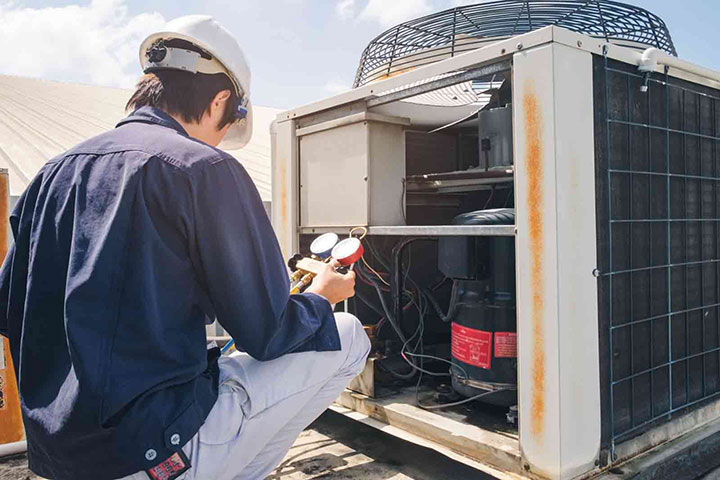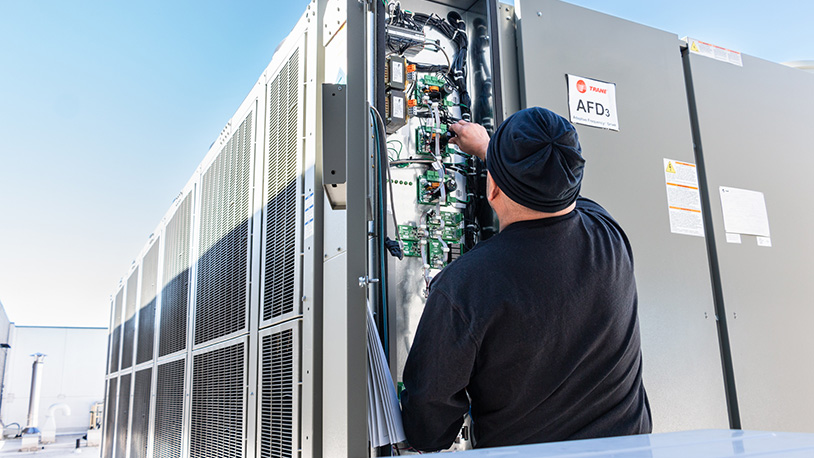Learn why HVAC experts are key for lasting system performance
Exploring the Important Components of a Reliable Cooling And Heating System
A reliable heating and cooling system is improved a number of crucial components that operate in consistency. Each part, from the thermostat to the ductwork, plays an essential role in preserving comfort and power performance. Recognizing these elements is vital for optimizing performance and boosting interior air high quality. As one takes a look at these elements, the intricate relationships between them reveal insights right into improving total system effectiveness. What details factors contribute most to this efficiency?
The Duty of the Thermostat in Cooling And Heating Performance

Although frequently overlooked, the thermostat plays a crucial duty in the efficiency of a/c systems. HVAC experts. This tiny device serves as the main control center, managing temperature level setups and ensuring perfect comfort within a room. By precisely sensing the ambient temperature level, the thermostat connects with the ventilation, heating, and air conditioning devices to maintain the desired environment
A reliable thermostat reduces power intake by turning on the HVAC system only when required, thereby preventing too much heating or cooling. Modern programmable and smart thermostats improve this effectiveness additionally by permitting individuals to establish timetables and remotely adjust setups, adjusting to day-to-day routines.
Furthermore, the placement of the thermostat is necessary; incorrect place can lead to imprecise temperature level readings, resulting in inefficient procedure. In general, a well-functioning thermostat not just boosts convenience but likewise contributes significantly to energy financial savings and the long life of the cooling and heating system.
Recognizing the Value of Air Filters
Air filters serve an important function in a/c systems by guaranteeing that the air circulating within an area remains tidy and healthy and balanced. These filters catch dirt, irritants, and other pollutants, stopping them from being recirculated throughout the environment. By catching these fragments, air filters add to boosted indoor air top quality, which can greatly benefit owners' health and wellness, specifically those with allergic reactions or breathing problems.
Furthermore, keeping clean air filters improves the efficiency of heating and cooling systems. Clogged filters can restrict airflow, causing the system to function harder to keep desired temperature levels, resulting in boosted energy intake and higher energy costs. Routinely replacing or cleaning up filters is a vital maintenance step that can extend the life-span of a/c devices. Eventually, comprehending the value of air filters allows house owners and structure supervisors to take aggressive measures to ensure a well-functioning, effective cooling and heating system that promotes a comfy and risk-free indoor atmosphere.

The Performance of the Heating System and Heatpump
Heating systems and heatpump are critical parts of cooling and heating systems, responsible for giving heat during cooler months. Furnaces operate by home heating air with combustion or electric resistance, then distributing it throughout the home by means of air ducts. They usually use fast home heating and can be sustained by gas, electrical power, or oil, depending on the system kind.
On the other hand, heat pumps move warmth instead of produce it. They extract warm from the outdoors air or ground, even in low temperatures, and move it indoors. HVAC experts. This twin capability permits heatpump to also supply cooling in warmer months, making them versatile options for year-round environment control
Both systems call for proper upkeep to guarantee effectiveness and long life. While heating systems stand out in extreme cold, warmth pumps can be useful in moderate environments. Comprehending their distinctive performances aids homeowners in selecting one of the most ideal choice for their heating requires.
Checking Out the Air Conditioning System
The air conditioning system is an important element of cooling and heating systems, readily available in various types to fit different needs. Recognizing the efficiency ratings of these units is crucial for making informed selections about power intake and cost. This section will discover the diverse types of ac system and clear up just how performance scores effect performance.
Kinds of Air Conditioners
While various elements influence the choice of air conditioning systems, comprehending the various kinds offered is vital for house owners and structure managers alike. Central air conditioners are designed to cool whole homes or structures, making use of a network of ducts for air flow. Window devices use a more local solution, ideal for single areas or small rooms. Mobile air conditioning unit offer versatility, enabling individuals to move the device as required. Ductless mini-split systems are one more option, combining the efficiency of main systems with the comfort of zoning, as they need no ductwork. Geothermal systems harness the planet's temperature for energy-efficient air conditioning. Each kind comes with distinctive advantages, making educated choices necessary for effective environment control.

Performance Scores Discussed
Recognizing efficiency rankings is vital for selecting the best air conditioning system, as these metrics provide insight right into the system's efficiency and energy consumption. One of the most common rating for air conditioners is the Seasonal Power Effectiveness Proportion (SEER), which measures the cooling output throughout a normal air conditioning period divided by the complete electric energy input. A greater SEER suggests better effectiveness. In addition, the Energy Effectiveness Ratio (EER) is utilized for gauging efficiency under specific conditions. Another important metric is the Energy Celebrity accreditation, which indicates that an unit satisfies stringent power performance guidelines. By evaluating these ratings, customers can make informed choices that not just maximize convenience but likewise minimize power costs and ecological effect.
The Value of Ductwork and Airflow
Reliable ductwork design and air flow administration play essential functions in the overall effectiveness and efficiency of HVAC systems. Appropriate ductwork warranties that conditioned air is distributed uniformly throughout a room, decreasing temperature level fluctuations and boosting comfort. Properly designed air ducts decrease resistance to airflow, minimizing the workload on a/c tools and ultimately reducing energy usage.
Airflow management entails strategically putting vents and registers to boost the circulation of air. This protects against common issues such as hot or cold spots, which can occur when air flow is blocked or inadequately well balanced. In addition, the right duct products and insulation can better boost performance by lowering warm loss or gain throughout air transportation.
A reliable ductwork system not just contributes to energy financial savings yet can likewise prolong the lifespan of HVAC equipment by reducing unneeded stress (HVAC experts). Consequently, understanding the importance of ductwork and air movement is vital for achieving peak cooling and heating system performance
Routine Maintenance Practices to Enhance Efficiency
Regular upkeep methods are vital for making sure peak efficiency of heating and cooling systems. These methods include regular inspections, cleaning, and necessary repair work to maintain the system running efficiently. Consistently altering air filters is crucial, as stopped up filters can block air flow and decrease effectiveness. Additionally, technicians must examine and tidy evaporator and condenser coils to stop overheating and energy wastefulness.
Annual specialist assessments are also suggested, as trained technicians can identify possible problems before they rise. Lubing relocating components lessens wear and tear, adding to a longer life-span for the system. Making sure that the thermostat functions properly help in maintaining excellent temperature control.
Regularly Asked Concerns
Just how Commonly Should I Replace My Thermostat?
Thermostats should generally be changed every 5 to one decade, relying on use and modern technology innovations. Regular checks are recommended to ensure peak performance, particularly if experiencing inconsistent temperature control or boosted energy costs.
What Size Air Filter Is Best for My Cooling And Heating System?
The most effective dimension air filter for an a/c system differs by device layout. Typically, it's crucial to get in touch with the proprietor's manual or inspect the existing filter measurements to ensure peak efficiency and air quality.
Can I Mount a Heat Pump Myself?
Installing a heatpump independently is possible for competent individuals, but it calls for expertise of neighborhood codes and electric systems. Hiring an expert is suggested to guarantee appropriate installation and ideal system performance.
How Do I Know if My Ductwork Is Reliable?
To establish ductwork performance, one ought check here to look for leaks, step air flow at vents, check insulation top quality, and review temperature distinctions in between supply and return ducts. Specialist analyses can offer extensive understandings right into total efficiency.
What Are Signs My HVAC Requirements Immediate Upkeep?
Signs that a heating and cooling system requires immediate upkeep include unusual sounds, inconsistent temperatures, raised power costs, undesirable smells, and frequent biking. Attending to these concerns without delay can stop additional damage and warranty top system efficiency.
Air filters offer an essential function in Heating and cooling systems by guaranteeing that the air flowing within an area stays healthy and balanced and tidy. Furthermore, maintaining clean air filters boosts the performance of Heating and cooling systems. Ductless mini-split systems are another option, combining the effectiveness of main systems with the comfort of zoning, as they require no ductwork. Understanding effectiveness scores is crucial for picking the best air conditioning device, as these metrics provide understanding into the system's efficiency and energy usage. The ideal dimension air filter for a Heating and cooling system differs by device design.